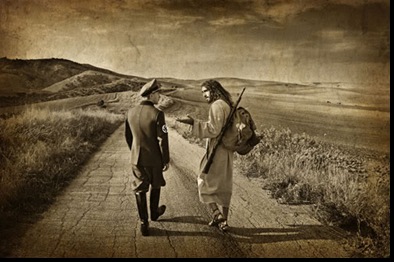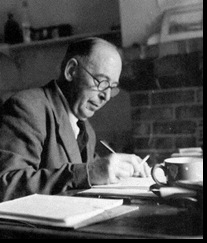I am trying to talk about Faith in the second sense, the higher sense. I said just now that the question of Faith in this sense arises after a man has tried his level best to practise the Christian virtues, and found that he fails, and seen that even if he could he would only be giving back to God what was already God’s own. In other words, he discovers his bankruptcy....
Now we cannot, in that sense, discover our failure to keep God’s law except by trying our very hardest (and then failing). Unless we really try, whatever we say there will always be at the back of our minds the idea that if we try harder next time we shall succeed in being completely good. Thus, in one sense, the road back to God is a road of moral effort, of trying harder and harder. But in another sense it is not trying that is ever going to bring us home. All this trying leads up to the vital moment at which you turn to God and say, ‘You must do this. I can’t.’ Do not, I implore you, start asking yourselves, ‘Have I reached that moment?’.... When the most important things in our life happen we quite often do not know, at the moment, what is going on. A man does not always say to himself, ‘Hullo! I’m growing up.’

It is often only when he looks back that he realises what has happened and recognises it as what people call ‘growing up’. You can see it even in simple matters. A man who starts anxiously watching to see whether he is going to sleep is very likely to remain wide awake. As well, the thing I am talking of now may not happen to every one in a sudden flash—as it did to St Paul or Bunyan: it may be so gradual that no one could ever point to a particular hour or even a particular year. And what matters is the nature of the change in itself, not how we feel while it is happening. It is the change from being confident about our own efforts to the state in which we despair of doing anything for ourselves and leave it to God.... The sense in which a Christian leaves it to God is that he puts all his trust in Christ:
trusts that Christ will somehow share with him the perfect human obedience which He carried out from His birth to His crucifixion: that Christ will make the man more like Himself and, in a sense, make good his deficiencies.
C.S. Lewis, Mere Christianity (1952; Harper Collins: 2001) 145-147.
 Good and evil both increase at compound interest. That is why the little decisions you and I make every day are of such infinite importance. The smallest good act today is the capture of a strategic point from which, a few months later, you may be able to go on to victories you never dreamed of. An apparently trivial indulgence in lust or anger today is the loss of a ridge or railway line or bridgehead from which the enemy may launch an attack otherwise impossible.
Good and evil both increase at compound interest. That is why the little decisions you and I make every day are of such infinite importance. The smallest good act today is the capture of a strategic point from which, a few months later, you may be able to go on to victories you never dreamed of. An apparently trivial indulgence in lust or anger today is the loss of a ridge or railway line or bridgehead from which the enemy may launch an attack otherwise impossible. 




























